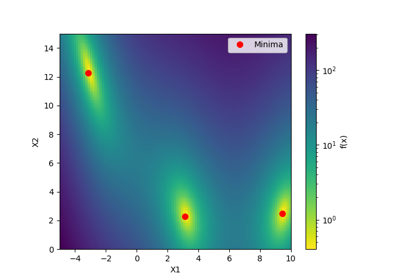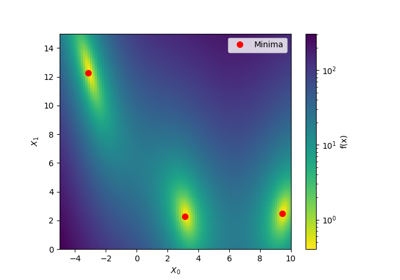skopt.dummy_minimize¶
- skopt.dummy_minimize(func, dimensions, n_calls=100, initial_point_generator='random', x0=None, y0=None, random_state=None, verbose=False, callback=None, model_queue_size=None, init_point_gen_kwargs=None)[source][source]¶
Random search by uniform sampling within the given bounds.
- Parameters
- funccallable
Function to minimize. Should take a single list of parameters and return the objective value.
If you have a search-space where all dimensions have names, then you can use
skopt.utils.use_named_args()as a decorator on your objective function, in order to call it directly with the named arguments. Seeuse_named_argsfor an example.- dimensionslist, shape (n_dims,)
List of search space dimensions. Each search dimension can be defined either as
a
(lower_bound, upper_bound)tuple (forRealorIntegerdimensions),a
(lower_bound, upper_bound, prior)tuple (forRealdimensions),as a list of categories (for
Categoricaldimensions), oran instance of a
Dimensionobject (Real,IntegerorCategorical).
- n_callsint, default: 100
Number of calls to
functo find the minimum.- initial_point_generatorstr, InitialPointGenerator instance, default:
"random" Sets a initial points generator. Can be either
"random"for uniform random numbers,"sobol"for a Sobol’ sequence,"halton"for a Halton sequence,"hammersly"for a Hammersly sequence,"lhs"for a latin hypercube sequence,"grid"for a uniform grid sequence
- x0list, list of lists or
None Initial input points.
If it is a list of lists, use it as a list of input points.
If it is a list, use it as a single initial input point.
If it is
None, no initial input points are used.
- y0list, scalar or
None Evaluation of initial input points.
If it is a list, then it corresponds to evaluations of the function at each element of
x0: the i-th element ofy0corresponds to the function evaluated at the i-th element ofx0.If it is a scalar, then it corresponds to the evaluation of the function at
x0.If it is None and
x0is provided, then the function is evaluated at each element ofx0.
- random_stateint, RandomState instance, or None (default)
Set random state to something other than None for reproducible results.
- verboseboolean, default: False
Control the verbosity. It is advised to set the verbosity to True for long optimization runs.
- callbackcallable, list of callables, optional
If callable then
callback(res)is called after each call tofunc. If list of callables, then each callable in the list is called.- model_queue_sizeint or None, default: None
Keeps list of models only as long as the argument given. In the case of None, the list has no capped length.
- Returns
- res
OptimizeResult, scipy object The optimization result returned as a OptimizeResult object. Important attributes are:
x[list]: location of the minimum.fun[float]: function value at the minimum.x_iters[list of lists]: location of function evaluation for each iteration.func_vals[array]: function value for each iteration.space[Space]: the optimisation space.specs[dict]: the call specifications.rng[RandomState instance]: State of the random state at the end of minimization.
For more details related to the OptimizeResult object, refer http://docs.scipy.org/doc/scipy/reference/generated/scipy.optimize.OptimizeResult.html
See also
functions
skopt.gp_minimize,skopt.forest_minimize,skopt.gbrt_minimize- res


